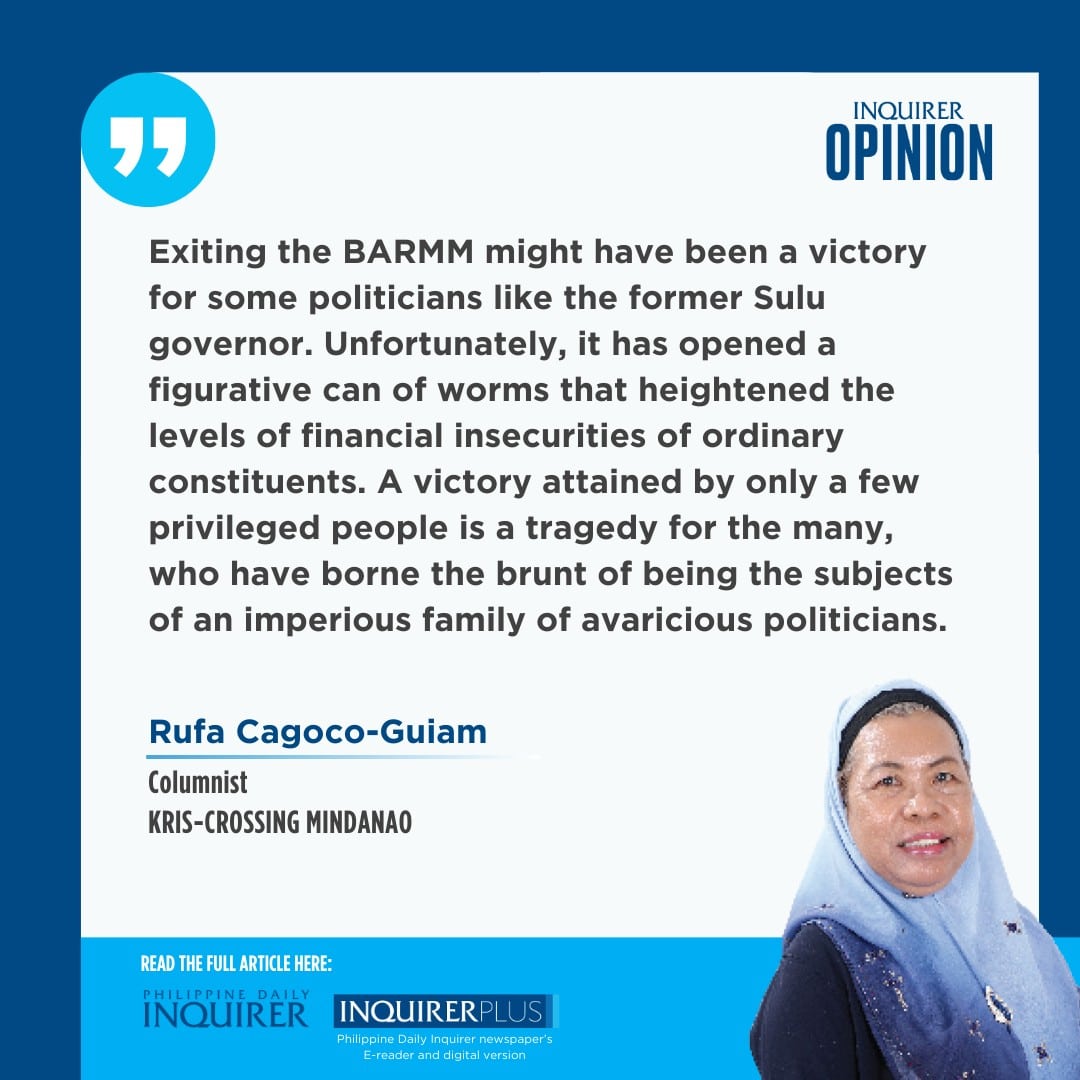Cotabato City—Former Sulu governor Abdusakur A. Tan, the petitioner for the exclusion of his province from the Bangsamoro autonomous region in Muslim Mindanao (BARMM) has expressed elation (“masayang-masaya kami”) over a Supreme Court decision on Sept. 9. In a recent social media post, he described how overwhelmed he and his cohorts are that the country’s highest court has granted their petition so
they are celebrating.
In contrast, thousands of local government functionaries, teachers, students, and the staff members of the provincial offices of regional agencies and commissions are crying their hearts out. They are not sure now where their monthly salaries and subsidies are coming from. Since the creation of the new BARMM in 2019, these provincial offices have relied on their share of the annual block grant given to the BARMM after the ratification of the Bangsamoro organic law (BOL) that created the regional government. That annual grant ranges from P80 billion to more than P100 billion annually. In the new configuration of again being part of Region 9, those dependent on the provincial offices fear that they might not be getting the same benefits they used to receive from the regional government.
Several infrastructure projects scheduled to commence as part of a commitment made by the regional government early this year might be canceled as well—unless the regional leadership gets a directive from the national government on how to resolve the situation. This situation calls for an urgent series of discussions between the Philippine government and the BARMM regional leadership via the Intergovernmental Relations Body, as provided for in the BOL.
While visiting some regional offices in BARMM, I heard complaints and received daily calls inquiring about the Sulu provincial staff’s monthly salaries and subsidies. They worry that if the BARMM ministries, commissions, and offices would insist on sending the usual salaries and subsidies of their functionaries in Sulu, they might be called out by the Commission on Audit for technical malversation.
Moreover, because of this Supreme Court decision, the annual block grant might be reduced. And the question remains: Where will this share of the subsidy go? Will it be reverted to the national government? Now that it is going to be “redirected” as a component province of an administrative region (Region 9, based in Pagadian City), Sulu is no longer entitled to a share of the regional block grant.
Another issue concerns the regional parliament where Sulu as a component province is entitled to at least 10 seats in the regular parliament—three for the provincial districts, as already provided in the recently approved Bangsamoro Local Government Code (BLGC), and seven party-based representatives. They will be elected by Sulu voters in the regular parliamentary elections that will take place in May 2025. The number of Sulu politicians to sit in the 2025 regular Parliament might increase if successful sectoral parties, like those of women and the youth, are able to get enough votes to nominate their representatives for a sectoral seat. If these nominated representatives are from Sulu, there would be at least two additional politicians from there.
Come to think of it, the BLGC might be amended even before its implementation. This also holds true with another crucial regional legislation that has been promoted by regional offices like the Bangsamoro Information Office—the Bangsamoro Electoral Code. Now that Sulu is no longer part of the BARMM, will this new code also be amended even before its implementation? Here, another crucial question begs to be asked: Will the regional parliamentary elections go on as scheduled, with “Sulexit” now a political reality? (The elections are supposed to be held together with the midterm national and local elections in May next year.)
The drastic Supreme Court decision did not provide for any transitional guidelines regarding financial arrangements that could have been made in the event of a component province opting out of the autonomous region.
Concerned BARMM ministries and offices have allayed the fears of their “former” functionaries in Sulu, with no less than the chief minister vowing to continue working with “inclusivity” as their main goal. The centrality of the province of Sulu in both historical and political narratives of the autonomous government cannot just be dismissed because of this “absurd” and critical Supreme Court decision. A legal luminary, former Regional Trial Court judge, Soliman Santos Jr., has expressed his dissenting opinion on the Sept. 9 Supreme Court decision in his recent opinion piece in mindanews.com.
Exiting the BARMM might have been a victory for some politicians like the former Sulu governor. Unfortunately, it has opened a figurative can of worms that heightened the levels of financial insecurities of ordinary constituents. A victory attained by only a few privileged people is a tragedy for the many, who have borne the brunt of being the subjects of an imperious family of avaricious politicians.
—————-
Comments to rcquiam@gmail.com
